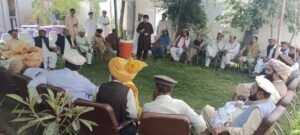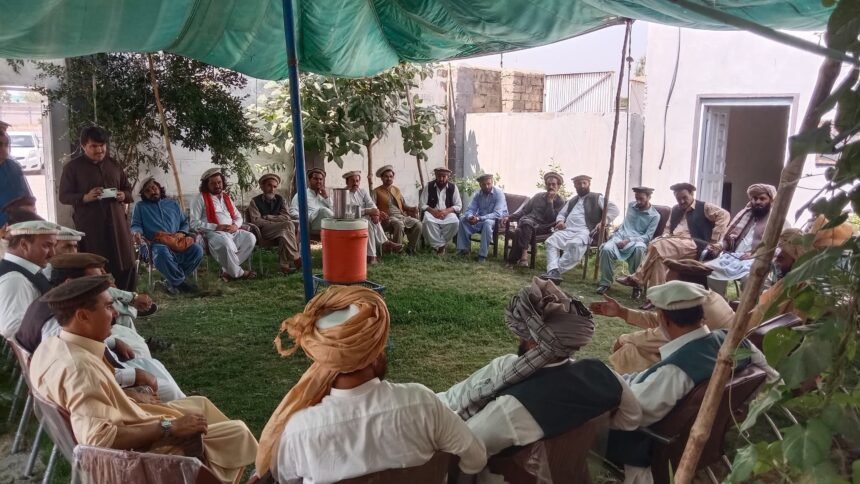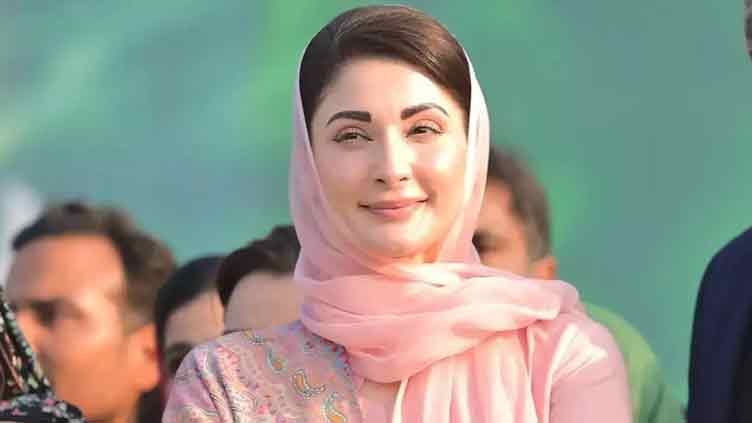By AK Wazir
In a landmark gathering held at the District Press Club in South Waziristan Lower, a grand tribal jirga of the Ahmadzai Wazir tribe convened under the auspices of the Wana Welfare Association (WAWA) on Friday. The jirga aimed to build consensus on local development initiatives, particularly the construction of five approved check dams intended to address the worsening water crisis and support agricultural livelihoods in the region.
The event saw active participation from a wide array of community stakeholders including tribal elders, religious scholars, lawyers, political and social leaders, and members of the business community. Notable figures in attendance included Malik Tariq Khan, Malik Jamil, Malik Saifullah, President of the Chamber of Commerce and Industry Saif-ur-Rehman Wazir, and former candidate national assembly Maulana Mahmood Alam Wazir.

During the proceedings, attendees unanimously pledged their full cooperation with the development work and resolved that no obstruction would be tolerated in the execution of the government-sanctioned check dam projects. The jirga firmly declared that no commissions would be demanded from contractors, there would be no undue interference in the construction process, and full security would be provided to engineers and workers on-site.
In his detailed briefing, WAWA President Rehmatullah Wazir disclosed that the five check dams are slated for construction at different locations in the Zalai area of tehsil birmal. He noted that the Khyber Pakhtunkhwa government, led by Chief Secretary Shahab Ali Shah, has approved Rs1 billion for the initiative. Construction is expected to commence soon, with a commitment to transparency, quality, and sustainability in every phase of the project.
President Rehmat Ullah Wazir also underscored the growing concern over declining groundwater levels, a phenomenon that has already begun to negatively affect orchards, farmlands, and household water availability. He stressed the strategic importance of the check dams in preserving water resources and boosting agricultural productivity.
He further informed the gathering that 46 feasible sites for future check dams have been identified by WAWA across Wana, and planning for the next phase of development is already underway.
Participants of the jirga strongly endorsed WAWA’s role in local development, describing the organization as credible, transparent, and deeply committed to public welfare. Speaking on behalf of the Ahmadzai Wazir community, several elders affirmed:
“We stand firmly with WAWA. We will not allow any disruption to these projects. These initiatives will create employment, improve irrigation, and secure a better future for our younger generations.”
There was also widespread appreciation for WAWA’s previous social and humanitarian efforts, with tribal leaders acknowledging the organization’s proactive engagement in identifying local issues and working towards viable, community-driven solutions. The jirga was seen not just as a consultative session, but as a powerful reflection of tribal unity and collective resolve. The discussions highlighted the community’s readiness to partner in state-led initiatives aimed at sustainable development.
In his concluding remarks, WAWA President Rehmatullah Wazir thanked all participants and emphasized the importance of unity and collaboration in bringing lasting progress to the region:
“This is our shared dream—to make South Waziristan a prosperous and self-reliant region. Achieving this vision will require collective commitment and coordinated effort from all segments of society.”






